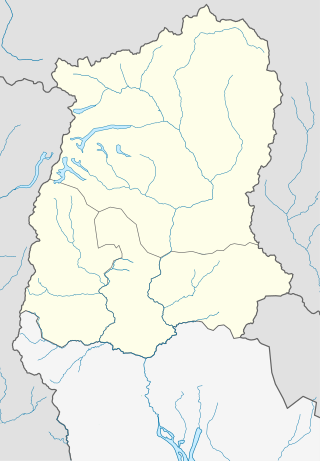
Sikkim is a state in northeastern India. It borders the Tibet Autonomous Region of China in the north and northeast, Bhutan in the east, Koshi Province of Nepal in the west, and West Bengal in the south. Sikkim is also close to the Siliguri Corridor, which borders Bangladesh. Sikkim is the least populous and second smallest among the Indian states. Situated in the Eastern Himalaya, Sikkim is notable for its biodiversity, including alpine and subtropical climates, as well as being a host to Kangchenjunga, the highest peak in India and third highest on Earth. Sikkim's capital and largest city is Gangtok. Almost 35% of the state is covered by Khangchendzonga National Park – a UNESCO World Heritage Site.

The Indian National Congress (INC), colloquially the Congress Party or simply the Congress, is a political party in India with widespread roots. Founded in 1885, it was the first modern nationalist movement to emerge in the British Empire in Asia and Africa. At the beginning the party contained moderates and later extremists, but from the late 19th century, and especially after 1920, under the leadership of Mahatma Gandhi, the Congress became the principal leader of the Indian independence movement. The Congress led India to independence from the United Kingdom, and significantly influenced other anti-colonial nationalist movements in the British Empire.

The Janata Party is a political party in India. It was founded as an amalgam of Indian political parties opposed to the Emergency that was imposed between 1975 and 1977 by Prime Minister Indira Gandhi of the Indian National Congress. In the 1977 general election, the party defeated the Congress and Janata leader Morarji Desai became the first non-Congress prime minister in independent modern India's history.

The United Progressive Alliance was a political alliance in India led by the Indian National Congress. It was formed after the 2004 general election with support from left-leaning political parties when no single party got the majority.
Sikkim National Congress was a political party in the Kingdom of Sikkim. It was founded in 1962, through a merger of Swatantra Dal, Rajya Praja Sammelan, and dissidents of the then-dominant parties, Sikkim State Congress and Sikkim National Party. Kazi Lhendup Dorjee was its leader.
Sikkim Janata Party was a political party in Sikkim. The party was founded in Gangtok on December 18, 1969 founded by Lal Bahadur Basnet. The party was formed after a split in the Sikkim National Congress. Basnet, a well-known journalist and former general secretary of the Sikkim National Congress, served as the president of the party. K.C. Pradhan was the general secretary of the party.
The Sikkim State Congress, or SSC, was an annexationist political party in the Kingdom of Sikkim. It was founded in 1947 and worked closely with the Indian National Congress (INC) to successfully achieve the annexation of Sikkim to India. Other parties established by the INC to serve India's interests in its near abroad included the Nepal State Congress Party and the Bhutan State Congress Party.

The Sikkim Legislative Assembly election of 2009 took place in April 2009, concurrently with the 2009 Indian general election. The elections were held in the state for all 32 legislative assembly seats along with the third phase of 2009 Indian general elections on 30 April 2009. The results were declared on 5 May 2009. The Sikkim Democratic Front (SDF) further strengthened their majority in the Sikkim Assembly by winning all the seats. Incumbent Chief Minister Pawan Kumar Chamling's Government returned for an unprecedented fourth consecutive term having won previous elections in 1994, 1999, and 2004.

The National People's Party is a national-level political party in India, though its influence is mostly concentrated in the state of Meghalaya. The party was founded by P. A. Sangma after his expulsion from the NCP in July 2012. It was accorded national party status on 7 June 2019. It is the first political party from Northeastern India to have attained this status.

The Sikkim Legislative Assembly is the unicameral state legislature of Sikkim state in north-eastern India. The seat of the Legislative Assembly is at Gangtok, the capital of the Sikkim state.
A referendum on abolishing the monarchy was held in the Kingdom of Sikkim on 14 April 1975. It was approved by 97.55% of voters, and resulted in the country becoming an Indian state.
General elections were held in Sikkim in May 1953. The Sikkim National Party and the Sikkim State Congress both won six seats. Voter turnout was less than 30%.
Sikkim Swatantra Dal was a political party in Sikkim. The party was founded and led by Namgay Tsering and Kazi Lhendup Dorji. The latter served as the president of the party. The party was launched ahead of the November 1958 election, formed after a split from the Sikkim State Congress. The party called for the abolition of the communal electoral system. Kazi Lhendup Dorji contested the November 1958 election, but lost his seat. All in all, Swantantra Dal won a single seat in the election.
General elections were held in Sikkim in January 1973. The Sikkim National Party emerged as the largest party, winning nine of the 18 elected seats.
General elections were held in Sikkim on 13 April 1974. They were the first elections in Sikkim to be held on the basis of universal suffrage, and also the last as an independent country. The result was a victory for the Sikkim National Congress, which won 31 of the 32 seats in the State Council. Kazi Lhendup Dorjee subsequently became Chief Minister. In May 1975 Sikkim became a state of India, at which point the State Council became the Sikkim Legislative Assembly.
The North-East Democratic Alliance is a political coalition that was formed on May 24, 2016, by Bharatiya Janata Party. The motive of the new political front was to protect the interest of the people of the region as well as uniting non-Congress parties in Northeast India. Himanta Biswa Sarma was appointed as the convenor of the front.

Sangha Assembly constituency is one of the 32 assembly constituencies of Sikkim, a state in the Northeast region of India. It is a part of the Sikkim Lok Sabha constituency. As of 2019, Sonam Lama is the holder of this seat. His current term is expected to end by 2024.

Nahakul Pradhan also known as Nakul Pradhan was a Sikkimese pre-merger politician, pro-democracy leader, a member of the Sikkim State Council and Executive Council of Sikkim serving multiple terms. He was the President of the Sikkim State Congress party and the Editor of Sikkim’s first news magazine Kanchenjunga.

The State Council of Sikkim was the legislative body of the erstwhile Kingdom of Sikkim, which was located in the Himalayas, between India and China.










